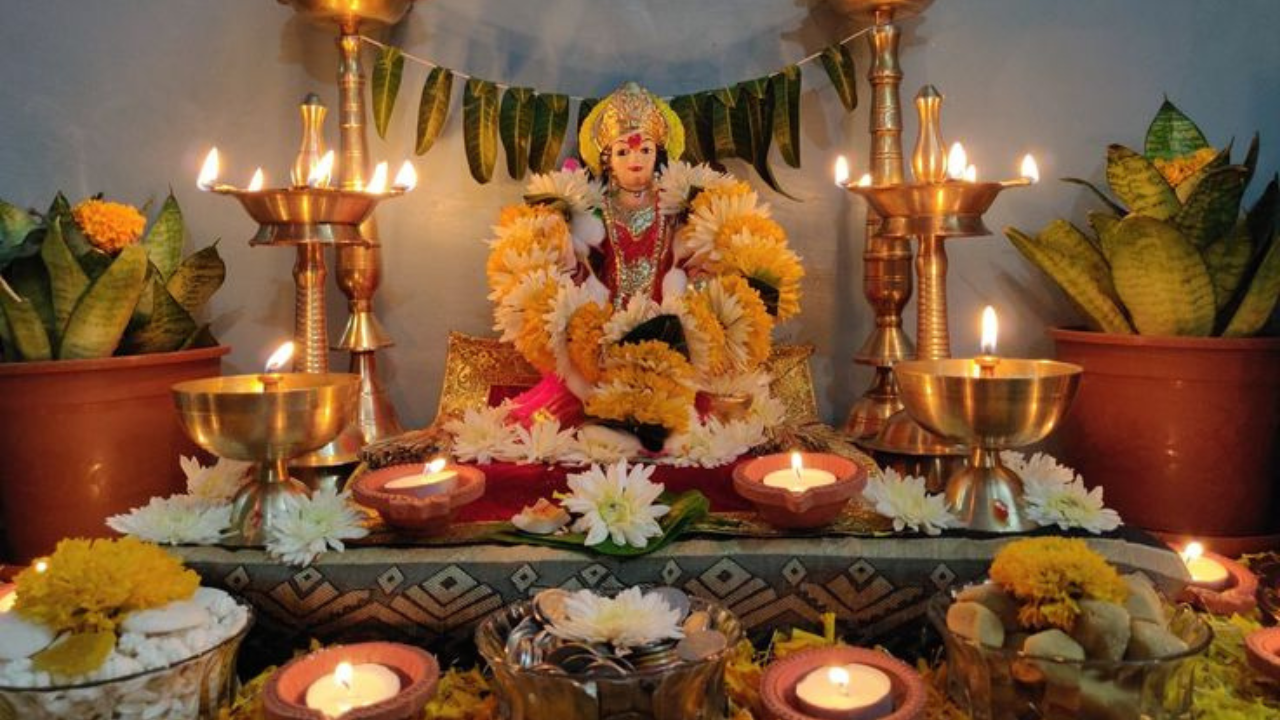Diwali, the Festival of Lights, is one of the most important Hindu festivals. People celebrate it with joy, devotion, and family bonding. Among all the rituals of this festival, the most sacred one is the Lakshmi Pooja in Diwali. On this day, devotees worship Goddess Lakshmi, the goddess of wealth, prosperity, and fortune.
This pooja does not only bring financial growth but also invites happiness, health, and spiritual balance. In this detailed guide, we will discuss the significance of Lakshmi Pooja in Diwali, its rituals, astrological importance, and the benefits that make it a powerful tradition.
Why Lakshmi Pooja in Diwali is Important
Lakshmi Pooja takes place on Amavasya (new moon night) in the Hindu month of Kartik, which usually falls in October or November. This night is the darkest of the year, and lighting diyas symbolizes the victory of light over darkness.
During this pooja, devotees worship three deities:
- Goddess Lakshmi for wealth and prosperity
- Lord Ganesha for wisdom and obstacle removal
- Lord Kubera for financial stability
Astrologically, Diwali aligns with important planetary movements. It is the period when the Sun stays in Libra and Venus, the planet of wealth and luxury, becomes highly active. Therefore, this pooja strengthens financial and spiritual well-being.
Spiritual Meaning of Lakshmi Pooja
The Lakshmi Pooja in Diwali holds both material and spiritual significance. On a material level, it is a prayer for abundance and financial growth. On a spiritual level, it reminds us to remove negativity and embrace purity.
Lighting diyas represents knowledge, chanting mantras symbolizes faith, and offering sweets reflects gratitude. In other words, the rituals help people align with positive energy and open the doors to divine blessings.
Preparations for Lakshmi Pooja in Diwali
Before the actual pooja begins, devotees prepare their homes carefully. Clean and pure surroundings are believed to attract Goddess Lakshmi.
Here are the main preparations:
- Cleaning and decoration: Remove clutter, dust, and negativity. Decorate the entrance with rangoli and flowers.
- Lighting diyas: Place lamps in every corner to remove darkness.
- Setting up the altar: Place idols or images of Goddess Lakshmi, Lord Ganesha, and Lord Kubera on a decorated platform.
- Arranging pooja items: Keep a kalash, turmeric, kumkum, sweets, flowers, incense, and coins ready.
These preparations do not only create a festive mood but also purify the atmosphere for positive vibrations.
Step-by-Step Rituals of Lakshmi Pooja
The correct method of worship plays a big role in attracting divine blessings. Let’s go step by step:
1. Purification of Home and Self
Take a bath and wear clean clothes. Sprinkle Gangajal around the house to purify the environment.
2. Setting the Altar
Place idols of Goddess Lakshmi and Lord Ganesha. Keep a kalash filled with water, topped with mango leaves and a coconut, symbolizing prosperity.
3. Invocation of Deities
Start with prayers to Lord Ganesha. After that, worship Goddess Lakshmi with flowers, sweets, and diyas. Also, offer coins and jewelry as symbols of wealth.
4. Chanting Mantras
Mantras create powerful vibrations. Devotees chant:
- “Om Shreem Mahalakshmyai Namah”
- “Om Gan Ganapataye Namah”
5. Aarti and Offerings
Perform aarti with family members. Offer fruits, sweets, and flowers while singing devotional songs.
6. Lighting Diyas
Light diyas inside and outside the house. They drive away darkness and attract positivity.
Astrological Benefits of Lakshmi Pooja
The Lakshmi Pooja in Diwali carries great astrological significance. Some of the key benefits include:
- Strengthens Venus (Shukra): Venus represents wealth, beauty, and luxury. The pooja balances its energy.
- Balances Rahu and Ketu: These shadow planets often create confusion. The ritual removes their negative influence.
- Improves Financial Stability: It helps in overcoming debt and financial struggles.
- Enhances Positive Energy: Harmony increases within families and relationships.
- Supports Career Growth: Business opportunities and professional success flow more easily.
Thus, this pooja becomes both a spiritual and astrological remedy.
Lakshmi Pooja Across India
The way people perform the Lakshmi Pooja in Diwali differs from region to region.
- North India: Homes and markets glow with diyas. Families exchange sweets and gifts.
- South India: The pooja is linked with Narak Chaturdashi and Bali Padyami. Devotees light lamps and pray for protection.
- West India: In Gujarat and Maharashtra, business owners perform “Chopda Pujan” to open new account books with blessings.
- East India: In Bengal, Lakshmi is worshipped along with Goddess Kali during Diwali celebrations.
Do’s and Don’ts of Lakshmi Pooja
Do’s:
- Keep the environment clean and bright.
- Use fresh flowers and fruits.
- Involve all family members.
- Spread positivity by sharing sweets and joy.
Don’ts:
- Avoid anger or negativity on this day.
- Do not use broken idols or torn notes for offerings.
- Avoid black clothes during pooja.
Scientific and Psychological Value
Apart from astrology, the Lakshmi Pooja in Diwali has psychological and scientific effects.
- Diyas purify the air and remove insects.
- Rangoli and decorations uplift mood.
- Family rituals increase bonding.
- Mantra chanting reduces stress and calms the mind.
Therefore, this festival becomes a complete package of health, happiness, and harmony.
How to Attract Goddess Lakshmi’s Blessings Throughout the Year
- Keep your surroundings clean and tidy.
- Light at least one diya every evening.
- Chant Lakshmi mantras daily.
- Donate food and money to the needy.
- Practice honesty in personal and professional life.
These small steps keep positive energy flowing year-round.
The Lakshmi Pooja in Diwali is more than just a festival ritual. It is a divine practice that invites wealth, peace, and balance into life. When performed with devotion and the right rituals, it strengthens planets, removes negativity, and creates prosperity.
Diwali reminds us to spread light, both inside and outside. By doing Lakshmi Pooja sincerely, families not only gain financial stability but also experience inner peace and spiritual growth.
